I was wrong about Google and Facebook: there’s nothing wrong with them (so say we all)
It’s always difficult admitting you’re wrong. But sometimes, it’s exactly what you have to do in the face of overwhelming evidence to the contrary. So, today, I admit that I was wrong about Google, Facebook, and surveillance capitalism in general being toxic for our human rights and democracy.
You see, it simply cannot be true given how they are endorsed by some of the most well-respected groups and organisations in the world. All the evidence points to Google and Facebook being good actors who are not a threats to our privacy.
FSF and The Software Freedom Conservancy
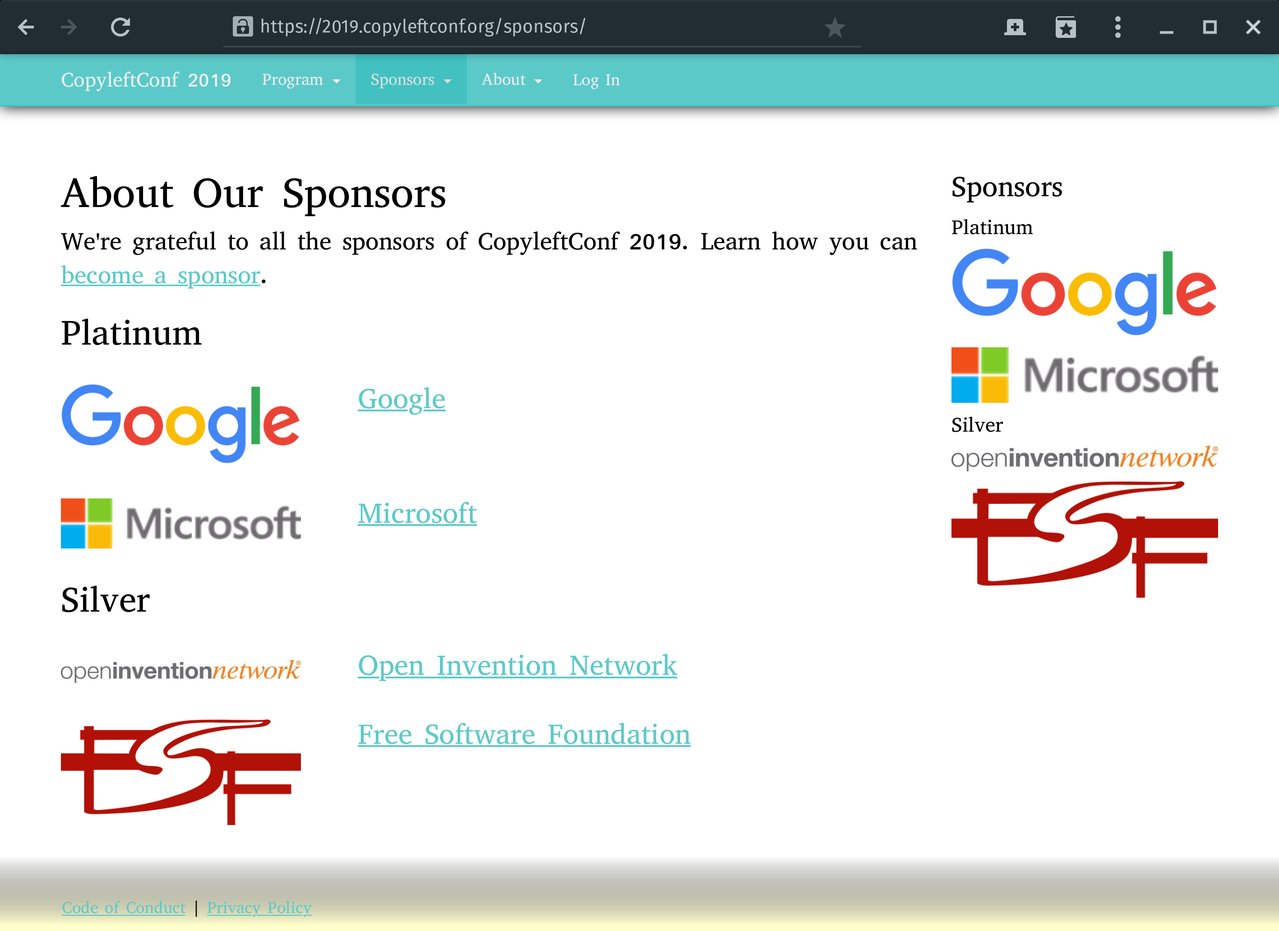
CopyLeftConf 2019 is brought to you by Google, Microsoft, and the FSF
The FSF is the world’s foremost defender of software freedom. The Software Freedom Conservancy “is a not-for-profit charity that helps promote, improve, develop, and defend Free, Libre, and Open Source Software (FLOSS) projects.” This month, The Software Freedom Conversancy is organising CopyLeft Conference sponsored by Google, Microsoft, and the FSF.
In fact, Google is such a force for good in the world that they are allowed to sponsor a CopyLeft conference even though they ban CopyLeft licenses at their company.
If even the FSF doesn’t have a problem with having their logo right next to Google and Microsoft’s, who am I to criticise these corporations?
How can I blame any policymaker who points to that and says “Aral, you’re being a bit melodramatic about these companies, aren’t you?” They’re right. I must be. What am I trying to do? Out-Stallman Stallman? Madness!
Mozilla
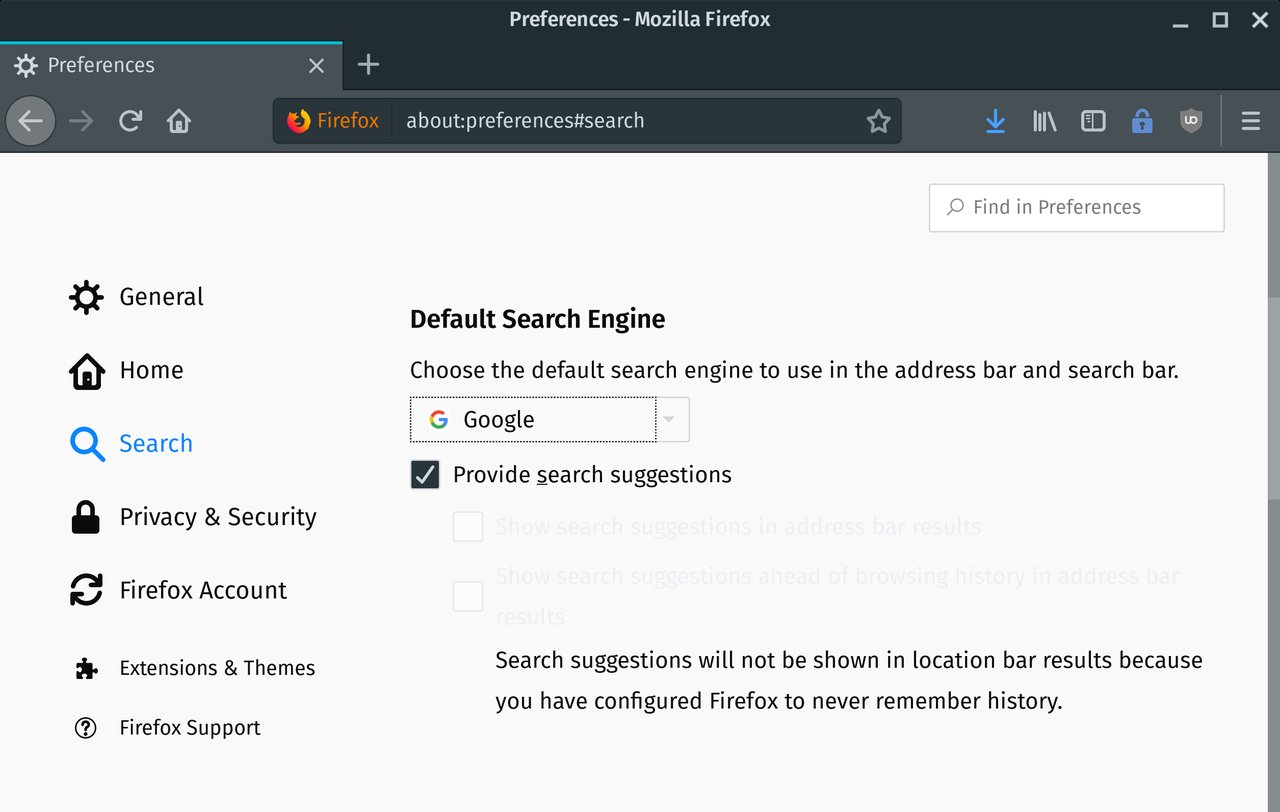
Firefox defends your privacy. That’s why its default search engine is Google.
Mozilla is a not-for-profit for-profit organisation working to ensure “an Internet that truly puts people first, where individuals can shape their own experience and are empowered, safe and independent.” Mozilla makes Firefox, a browser that is Fast. Private. Fearless. That’s why its default search engine is Google1.
Mozilla doesn’t have a problem with Google, frequently partners with them, and even uses Google Analytics.
If such an upstanding and ethical not-for-profit for-profit that cares so deeply about protecting our privacy has no problem with having Google as its primary search engine or taking hundreds of millions of dollars from them, who am I to criticise Google on privacy?
Apple
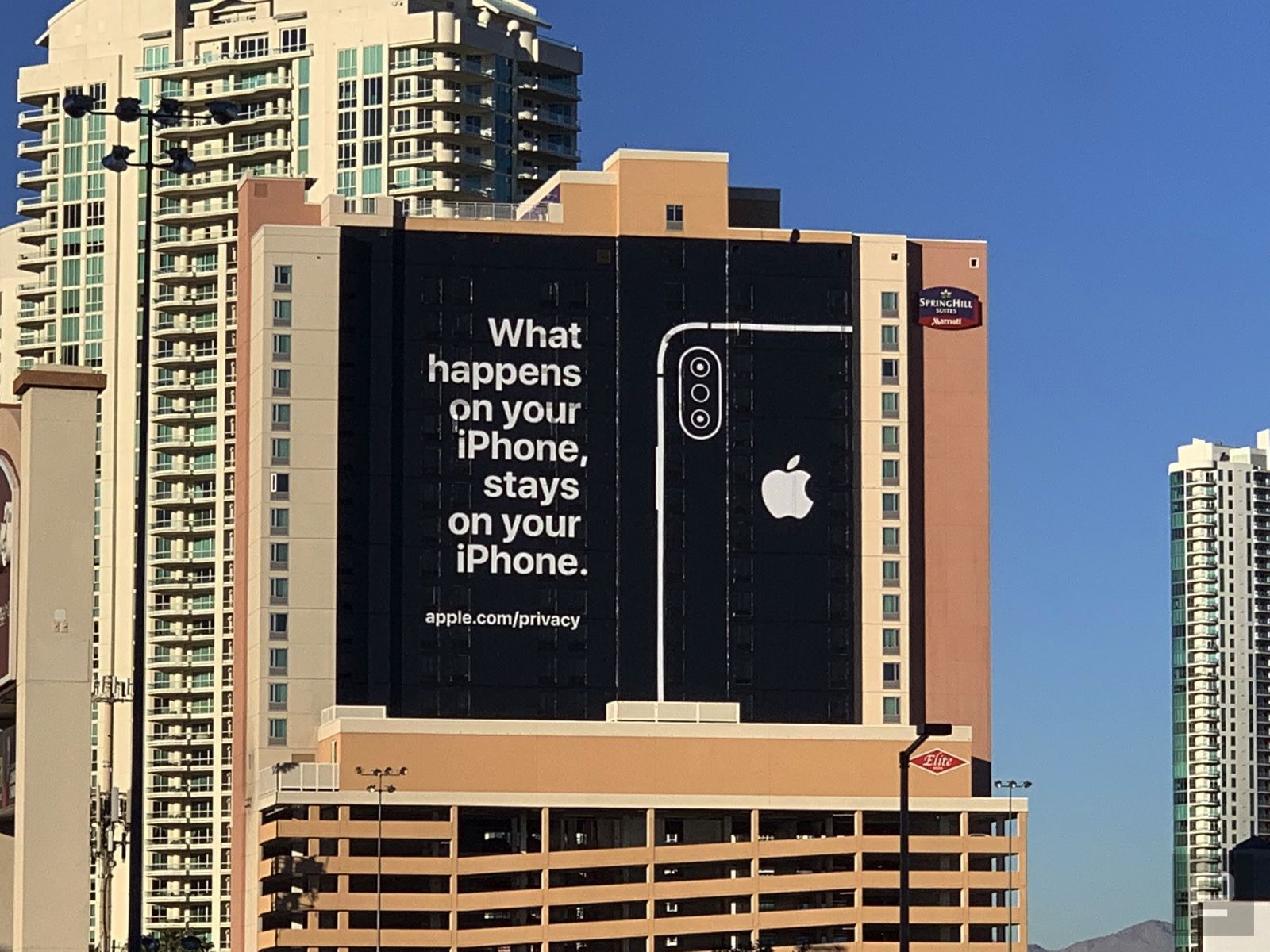
Apple’s devices protect your privacy. Google is the primary search engine on their browser. Google must also protect your privacy. (Photo: Chris Velazco, Engadget)
Apple’s business model is to sell products to people. They are proud that this separates them from companies that sell people to people. As their building-tall ad at CES says, “What happens on your iPhone, stays on your iPhone.”
As they state on their privacy page:
At Apple, we believe privacy is a fundamental human right … Every Apple product is designed from the ground up to protect that information. And to empower you to choose what you share and with whom.
Apple’s CEO, Tim Cook, has personally endorsed this commitment to privacy and this is why Apple has Google as the default search engine for their browser and why they welcome the 12 billion dollars of revenue that this deal brings in. Because Google is just like Apple and designs their services from the ground up to protect your privacy. Why else would Apple allow them on their phones and jeopardise your privacy?
If Tim Cook is happy having Google on the iPhone then surely there must be something wrong with me.
GNOME
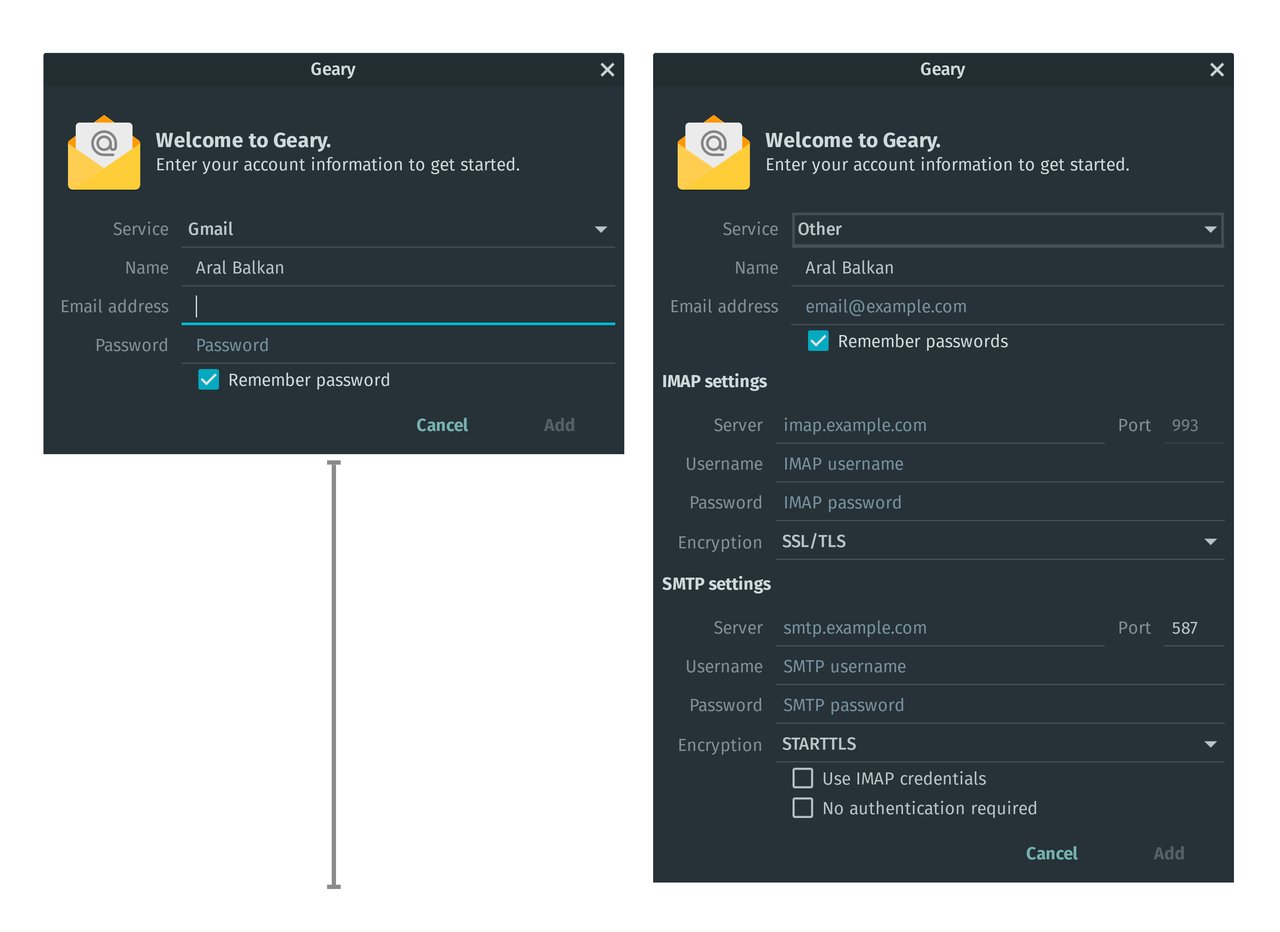
GNOME makes it easy to use Gmail (by advisory board member Google). If you use FastMail, however, you have to do some work.
If Apple is too commercial an example for you, then there’s GNOME, led by the non-profit GNOME foundation. They make a popular and usable display environment for UNIX-like systems. It’s what I use on my daily driver.
GNOME doesn’t see a problem with Google. In fact, Google is on their advisory board and apps on GNOME have first-class support for Google’s services.
Geary, the email application, for example, has Gmail listed in first place in the account setup dropdown and makes it trivial to get started with a simple interface that’s far easier to use than setting up a generic IMAP provider.
If Gmail was bad for your privacy – if, for example, Google read all your messages and used it to profile you (I know, there I go with the nutty conspiracy theories again) – then GNOME foundation would not promote it in their software.
If they were forced to support Gmail just because it’s popular but absolutely hated doing so, they would put up a warning message to protect you. Something like “When you use Gmail, Google, Inc. will use the contents of your messages to profile you. Please only proceed if you understand the dangers.” But they don’t do that. On the contrary, they put it first and make it as easy as possible to set up and use so Gmail must be fine.
In fact, I think we have to start asking questions about some of these other email providers who say they don’t spy on you. Like FastMail, the service I use.
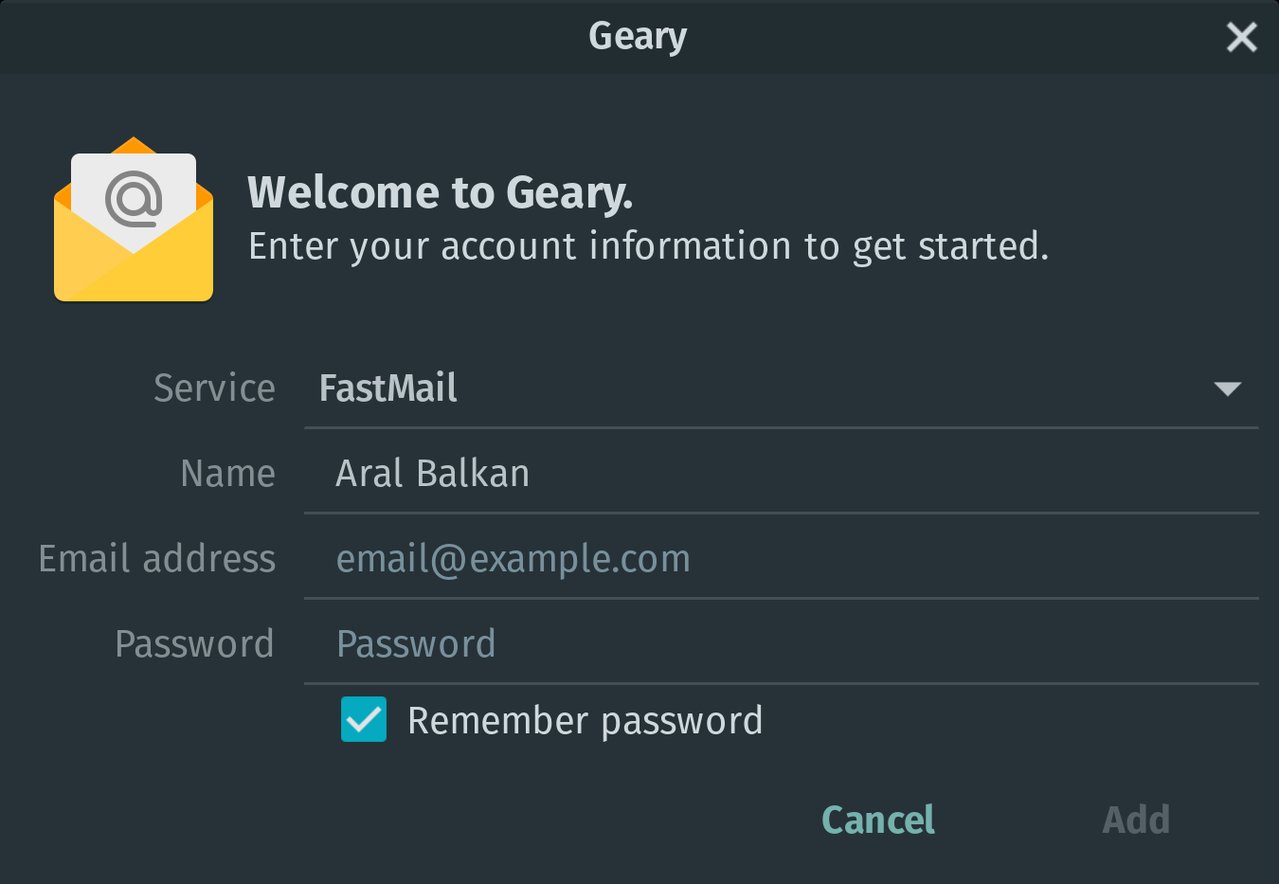
My fork of Geary has FastMail as a first-class citizen. This is because I must be a communist.
When I added support for FastMail to Geary, my changes were rejected. If FastMail was an ethical provider of email, I’m sure that this would not have been the case. No doubt the team would have fallen over themselves to promote an ethical email service over an unethical one that reads people’s emails and profiles them.
So now I’m worried about what GNOME knows about FastMail that I don’t. What are those sneaky FastMail people up to? Maybe we should all move to Gmail. It’s what GNOME recommends by default, after all.
Nordic Privacy Arena
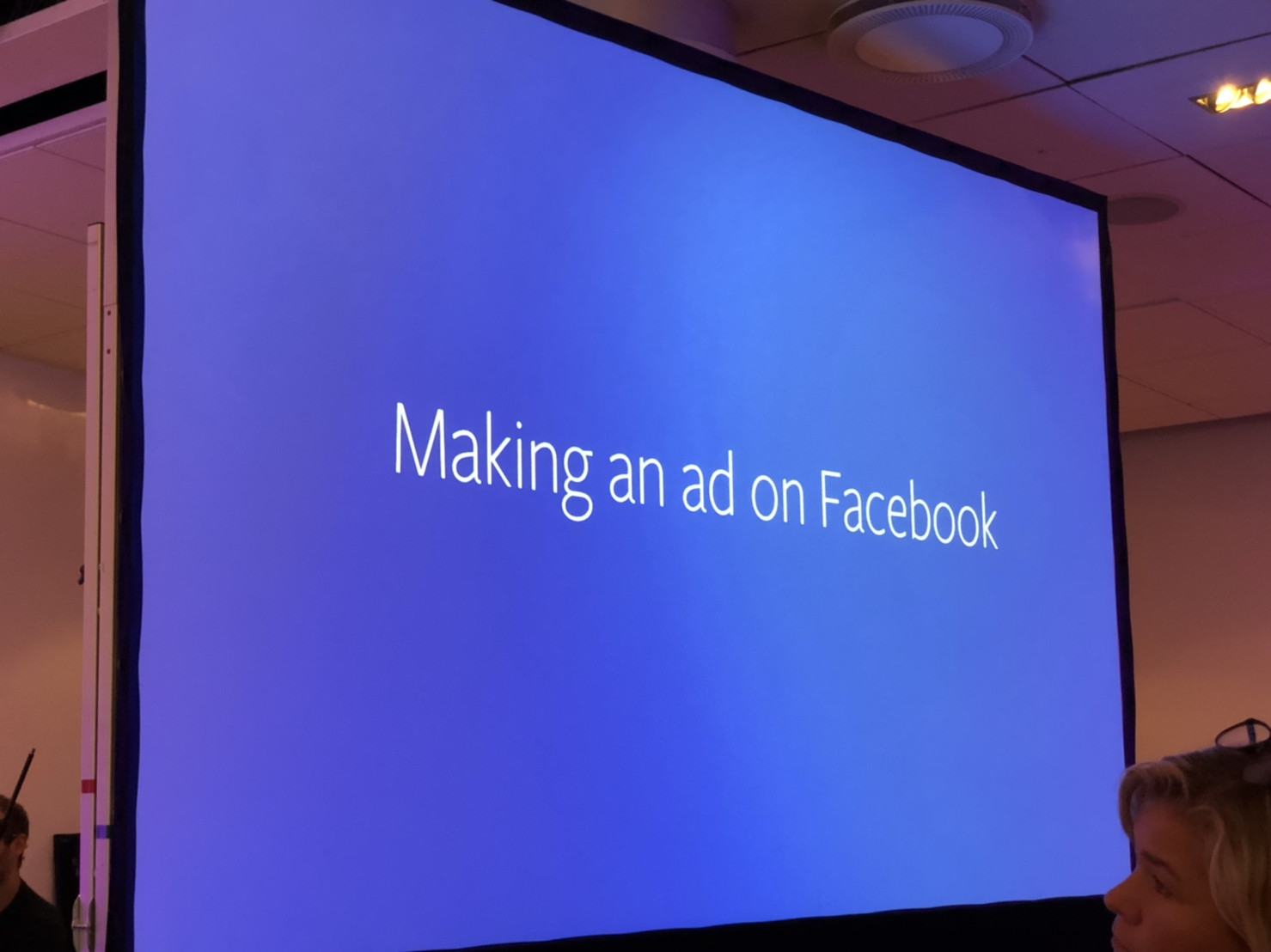
We learned how to make Facebook ads at the Facebook keynote at the Nordic Privacy Arena. I was not clever enough to appreciate it.
The Nordic Privacy Arena is a yearly gathering of data protection officers and privacy professionals. At this year’s event, Facebook had a keynote and I was told by the organisers to be nice to Facebook and Google, keep my points to my own talk and not challenge the speaker with questions after his talk like I did at Mozilla’s session.
They were so right! What was I thinking? Thankfully, they cut my question from the video of Mozilla’s talk so you don’t have to be subjected to my radical conspiracy theory that if you’re getting hundreds of millions of dollars from a corporation you perhaps might not be working against its interests.
I apologise profusely for being such a silly little pain in the ass. After all, if the data protection officers and privacy professionals organising and attending this event see no problem with Facebook or Google, who am I to disagree? These people are tasked with protecting our privacy. Surely, they have our best interests at heart and understand the basics of their job well enough to know exactly what they’re doing when they invite Google to keynote their next event.
Furthermore, the Facebook keynote was by Nicolas de Bouville whose previous job was at the French data protection office (CNIL), famous for its magnificient revolving doors. So if Nicolas chose to go work at Facebook after CNIL, surely Facebook can’t be that bad.
And it’s not just Nordic Privacy Arena. RightsCon by AccessNow has no problem with Google or Facebook. As they state on their web site:
RightsCon is the world’s leading conference on human rights in the digital age, brought to you by Access Now … RightsCon offers organizations and businesses the perfect opportunity to generate exposure, goodwill, and growth. So when you consider whether to invest in RightsCon, remember sponsorship can positively impact your organization and business by demonstrating leadership, building your brand, engaging your community, and more.
Neither does Amsterdam Privacy Week. Nor CPDP. Nor FOSDEM.
No, it’s clear. It must be me. I must just be deluded. This is the only conclusion that makes sense given the avalanche of evidence.
War is Peace, Freedom is Slavery, Surveillance is Privacy
So, in light of the overwhelming support for surveillance capitalism by generally well-respected organisations that say they work to protect our human rights, privacy, and democracy, I have decided that I must be the one who’s wrong.
If Google, Facebook, etc., were even half as bad as I make them out to be, these organisations would not be partnering with or endorsing them.
I just want to apologise for being such a “Negative Nancy” and take this opportunity to thank the FSF, The Free Software Conservancy, Mozilla, Apple, The Nordic Privacy Arena, AccessNow, RightsCon, Amsterdam Privacy Week, CPDP, and GNOME for showing me the error of my ways. I now know, thanks to their moral leadership on this issue, that it’s perfectly fine for people working to protect human rights and democracy to take millions and billions from companies like Google and Facebook and to partner with them.
I must admit, I feel a little silly. The last five years would have been so much easier if only I’d understood this earlier.
Here’s wishing you all a world full of freedom sponsored by Google, privacy sponsored by Facebook, and democracy sponsored by Palantir.
And, if for some wild reason that’s not the world you want to live in, then maybe it’s time for some organisations to take a fucking stand. Start calling surveillance capitalists “surveillance capitalists.” Say no to their money. And stop legitimising these bastards.
-
Mozilla is now trying to diversify its revenue stream and, in some markets, has different default search engines. For example, it partners with privacy-championing Chinese search engine Baidu in China. ↩︎